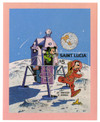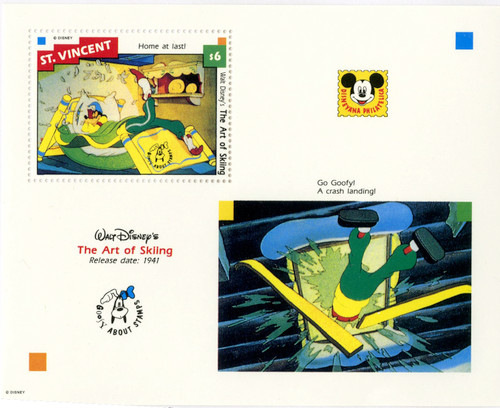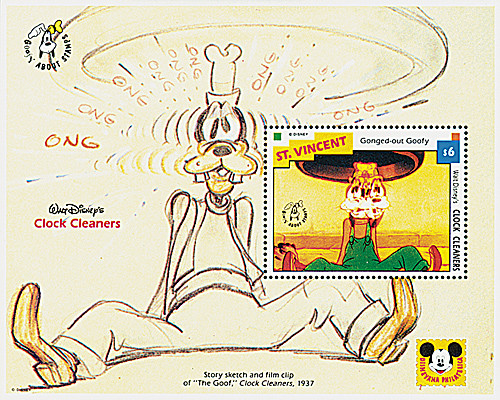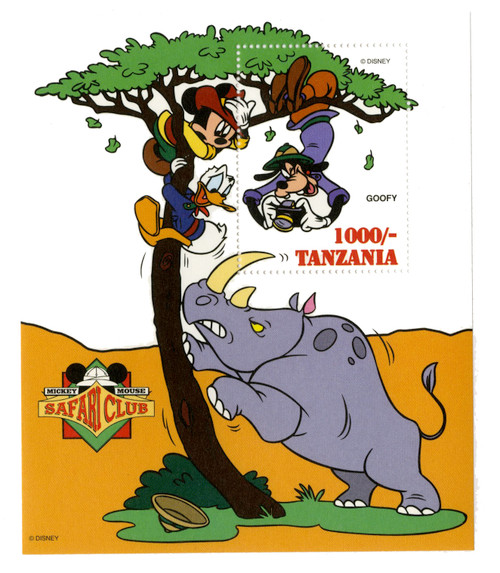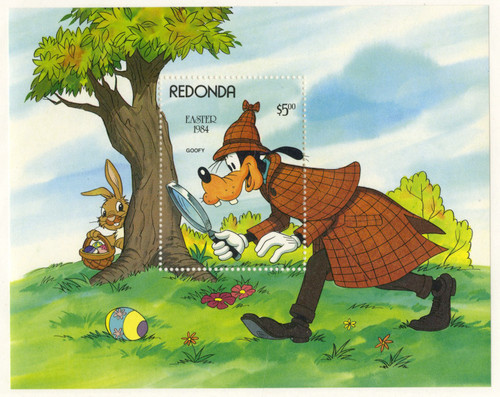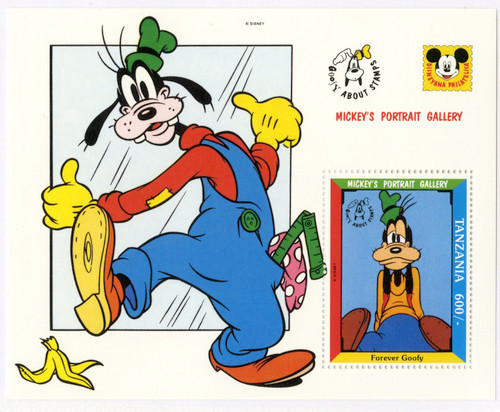
# MDS470B - St. Lucia 1980 Goofy on the moon, S/S
From Sidekick to Superstar
Goofy’s first appearance was 1932’s Mickey’s Revue, in which he was named Dippy Dawg. Although he had only a small part in the cartoon, his hysterical laughter caught the attention of fans. This earliest version of Goofy came adorned with square glasses and whiskers.
In 1934’s Orphan’s Benefit, Dippy was changed to Goofy. In the following year’s Moving Day, his character was made more prominent and well-defined. Goofy started down the path that would make him one of Disney’s biggest stars.
Goofy’s big break came in 1939, with his first solo-starring cartoon Goofy and Wilbur, in which Goofy and his friend Wilbur, a grasshopper, go fishing. This cartoon was also the first to show Goofy’s range of emotions.
Goofy’s “how to” series began in 1941. In these hilarious films, audiences watched as Goofy tried to act out the sporting situations as described by a boring professor. These sequences, which more accurately serve as “how not to” demonstrations, were some of the most side-splitting cartoons of his career. And they are what he is most loved for.
By the 1980s, Goofy’s popularity from his sporting films catapulted him beyond stardom. He served as the official mascot of the French Olympic team and the International Tennis Federation Junior World Tennis Championship. He was displayed on over 30 different sporting outfits and a large number of sporting accessories. He even recorded a song entitled “You Can Always Be Number One,” to encourage kids to joins sports. His message – to enjoy the game and not worry about winning or losing – was an inspiration to a whole generation of children.
Goofy’s clumsy antics and over-the-top hilarity won him world-wide fans, but his genuine and kind-hearted nature won our hearts.
From Sidekick to Superstar
Goofy’s first appearance was 1932’s Mickey’s Revue, in which he was named Dippy Dawg. Although he had only a small part in the cartoon, his hysterical laughter caught the attention of fans. This earliest version of Goofy came adorned with square glasses and whiskers.
In 1934’s Orphan’s Benefit, Dippy was changed to Goofy. In the following year’s Moving Day, his character was made more prominent and well-defined. Goofy started down the path that would make him one of Disney’s biggest stars.
Goofy’s big break came in 1939, with his first solo-starring cartoon Goofy and Wilbur, in which Goofy and his friend Wilbur, a grasshopper, go fishing. This cartoon was also the first to show Goofy’s range of emotions.
Goofy’s “how to” series began in 1941. In these hilarious films, audiences watched as Goofy tried to act out the sporting situations as described by a boring professor. These sequences, which more accurately serve as “how not to” demonstrations, were some of the most side-splitting cartoons of his career. And they are what he is most loved for.
By the 1980s, Goofy’s popularity from his sporting films catapulted him beyond stardom. He served as the official mascot of the French Olympic team and the International Tennis Federation Junior World Tennis Championship. He was displayed on over 30 different sporting outfits and a large number of sporting accessories. He even recorded a song entitled “You Can Always Be Number One,” to encourage kids to joins sports. His message – to enjoy the game and not worry about winning or losing – was an inspiration to a whole generation of children.
Goofy’s clumsy antics and over-the-top hilarity won him world-wide fans, but his genuine and kind-hearted nature won our hearts.



